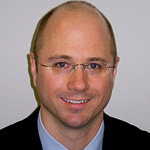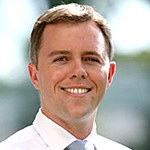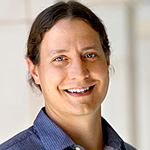The following are among the new faculty members at Washington University. Others will be introduced periodically.
 Mark Anastasio, PhD, joins the Department of Biomedical Engineering in January 2011 as professor. He earned a doctorate in medical physics from the University of Chicago in 2001. He comes to Washington University from the Illinois Institute of Technology, where he was an associate professor of biomedical engineering. His research interests include the development of biomedical imaging methods that exploit wave physics to provide important structural and physiological information about biological tissues. These methods include photoacoustic and thermoacoustic imaging, X-ray phase-contrast imaging, optical and acoustical tomography and holography.
Mark Anastasio, PhD, joins the Department of Biomedical Engineering in January 2011 as professor. He earned a doctorate in medical physics from the University of Chicago in 2001. He comes to Washington University from the Illinois Institute of Technology, where he was an associate professor of biomedical engineering. His research interests include the development of biomedical imaging methods that exploit wave physics to provide important structural and physiological information about biological tissues. These methods include photoacoustic and thermoacoustic imaging, X-ray phase-contrast imaging, optical and acoustical tomography and holography.
 John Fortner, PhD, joins the Department of Energy, Environmental and Chemical Engineering as assistant professor. Fortner earned a doctorate in environmental engineering from Rice University in 2006 and held postdoctoral positions at Georgia Institute of Technology and ETH-Zurich. He comes to Washington University from Rice, where he was an Intelligence Community Postdoctoral Research Fellow. His research is focused on the environmental implications and applications of advanced materials. He studies the environmental fate, reactivity and toxicology of engineered carbon nanomaterials (such as fullerenes and carbon nanotubes) in aqueous systems. He also is developing nanoscale iron-based materials to act as heavy metal sensors and for high-efficiency water treatment processes. Other research interests include advanced materials for disinfection, in situ (bio)remediation and sustainable development.
John Fortner, PhD, joins the Department of Energy, Environmental and Chemical Engineering as assistant professor. Fortner earned a doctorate in environmental engineering from Rice University in 2006 and held postdoctoral positions at Georgia Institute of Technology and ETH-Zurich. He comes to Washington University from Rice, where he was an Intelligence Community Postdoctoral Research Fellow. His research is focused on the environmental implications and applications of advanced materials. He studies the environmental fate, reactivity and toxicology of engineered carbon nanomaterials (such as fullerenes and carbon nanotubes) in aqueous systems. He also is developing nanoscale iron-based materials to act as heavy metal sensors and for high-efficiency water treatment processes. Other research interests include advanced materials for disinfection, in situ (bio)remediation and sustainable development.
Matthew Kerr, PhD, joins the Department of Mathematics in Arts & Sciences as assistant professor. Kerr earned a doctorate in mathematics from Princeton University in 2003. He subsequently held positions at the University of California, Los Angeles, Max Planck Institut and University of Chicago. A lecturer at Durham University since 2007, Kerr received one of the most substantial first grants awarded to a mathematician by the Engineering and Physical Sciences Research Council in 2009. His research interests lie in algebraic geometry: Hodge theory, algebraic cycles and problems at the interface of these areas with mathematical physics and number theory, in particular. Kerr recently gave invited talks at the Regulators III conference in Barcelona, Spain, and at the ICTP Summer School on Hodge Theory in Trieste, Italy.
Paul Ramírez, PhD, joins the Department of History in Arts & Sciences as assistant professor. He recently earned a doctorate from the University of California, Berkeley, and holds degrees in the study of religion from Harvard Divinity School and Harvard College. His specialization is the intersecting histories of medicine and religion in late colonial and early republican Latin America. His dissertation, titled Minerva’s Mexico: Science, Religion, and the Art of Healing in Late Colonial Epidemics, examines the ways ritual performances, rumors and lay healing knowledge shaped the official implementation of immunization in colonial Mexico.

Brent Williams, PhD, joins the Department of Energy, Environmental and Chemical Engineering as assistant professor. Williams earned a doctorate from the University of California, Berkeley, where he developed novel organic aerosol measurement instrumentation, which he deployed in the field to study issues ranging from urban and agricultural pollution to long-range transport of pollutants. After completing a doctorate, he served as a postdoctoral associate at the University of Minnesota Particle Technology Laboratory and as a postdoctoral scientist at Aerodyne Research Inc. Williams’ research interest is the role of biogenic and anthropogenic gases and particles in the earth’s climate system.